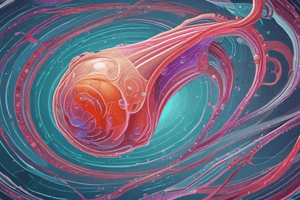Podcast
Questions and Answers
What are the three main stages that describe reproduction?
What are the three main stages that describe reproduction?
- Respiration, photosynthesis, locomotion
- Cell division, mutation, adaptation
- Gamete production, fertilization, development (correct)
- Digestion, absorption, excretion
Which process reduces the chromosome number by half in sex cells?
Which process reduces the chromosome number by half in sex cells?
- Crossing over
- Mitosis
- Fertilization
- Meiosis (correct)
What is the result of the fusion of a sperm and an egg?
What is the result of the fusion of a sperm and an egg?
- Homologous chromosomes
- Meiosis II
- Diploid zygote (correct)
- Haploid gamete
What is the correct sequence of events in gamete production?
What is the correct sequence of events in gamete production?
Where does fertilization typically occur in most animals?
Where does fertilization typically occur in most animals?
What is the initial stage of development in animals?
What is the initial stage of development in animals?
What is a key focus of biology research?
What is a key focus of biology research?
What role do laboratory assistants play in the field of reproduction?
What role do laboratory assistants play in the field of reproduction?
Why is understanding reproduction important in biology?
Why is understanding reproduction important in biology?
What do molecular biologists study in reproduction research?
What do molecular biologists study in reproduction research?
Flashcards are hidden until you start studying
Study Notes
Biology: The Fundamentals of Reproduction
Reproduction is a vital process in biology, driving the growth and continuation of living organisms. This essential aspect of life encompasses a variety of mechanisms that guarantee species survival and evolution.
Overview
Reproduction can be described through three main stages: gamete production, fertilization, and development. In sexually reproducing organisms, gametes are haploid cells (containing one set of chromosomes) that can fuse to form a diploid zygote. Fertilization is the fusion of a sperm (male gamete) and an egg (female gamete) to create a zygote, which then develops into a new individual.
Gamete Production
Gamete production begins with meiosis, a process that reduces the chromosome number by half in sex cells. Meiosis consists of two cell divisions: meiosis I and meiosis II. During meiosis I, homologous chromosomes pair and, through a process called crossing over, exchange genetic material. This results in four daughter cells, each containing one set of chromosomes. Meiosis II further divides these cells, creating haploid gametes.
Fertilization
Fertilization is the union of a sperm and an egg, resulting in a diploid zygote. This process is specific to sexually reproducing organisms. In most animals, fertilization occurs inside the female's body, while in plants, it can take place on the surface of an ovule or within its tissues.
Development
Development is the process of transforming a zygote into a new individual. The zygote undergoes a series of cell divisions and differentiations to form a multicellular organism. In animals, development begins with a blastula stage, which evolves into a gastrula stage, and finally, an embryo. In plants, development proceeds from a zygote to an embryo, and later, a seedling.
Research in Reproduction
Reproduction is a major focus of biology research, with scientists studying the mechanisms, genetics, and evolution of this process. For example, molecular biologists investigate the role of specific genes in gamete formation and fertilization, while evolutionary biologists examine the adaptive benefits of different reproductive strategies.
Laboratory Assistants in Reproduction
Laboratory assistants play a crucial role in supporting biologists and researchers in the field of reproduction. They perform a variety of tasks, including operating laboratory equipment, maintaining laboratory techniques, and studying laboratory tasks in biochemistry and cell biology, as described in the PROKLAS instrument.
Significance
Reproduction is a fundamental aspect of biology, as it ensures the continuation of species and drives evolution. Understanding this process helps scientists to develop new techniques for fertility management, aiding in the conservation and control of endangered species, and to combat infertility in humans.
In conclusion, reproduction is a fascinating biological process that guarantees species survival and evolution. With the help of laboratory assistants and biologists, we continue to study and understand this process, advancing our knowledge and technological capabilities in the field of biology.
Studying That Suits You
Use AI to generate personalized quizzes and flashcards to suit your learning preferences.



